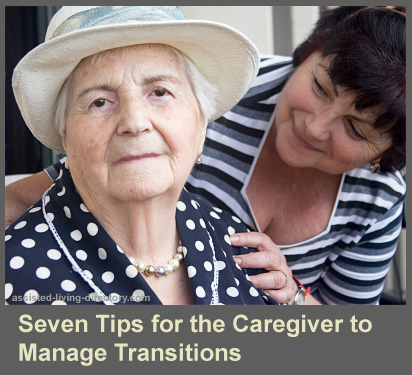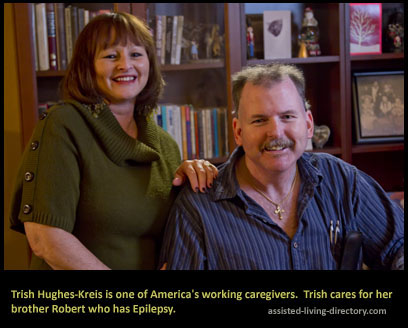7 Ways For The Caregiver To Manage Transitions

7 Ways for the Caregiver to Manage Transitions
Summary: From personal experience, Trish offers her suggestions and tips on managing transitions that will most certainly occur with any caregiver or family.
Author: Trish Hughes Kreis exclusively for Assisted Living Directory
Benjamin Franklin may have said, “In this world nothing can be said to be certain, except death and taxes” but caregivers know one other certainty: change is a constant in caregiving.

Whether the caregiver comes to the realization that living independently is no longer an option for their aging relative or needs to Caregivers Managing Transitionsfind a suitable assisted living facility or realizes a trip to the emergency room is warranted, changes happen frequently.
Managing these transitions and changes can be a struggle for caregivers because they can happen so quickly. Expecting changes and preparing for them ahead of time can be a huge help and relieve the stress of the quickly changing situations.
These seven tips can help caregivers manage the transitions and be as prepared as possible during their caregiving role.

Be Informed.
No matter the condition of the caree, the caregiver can find information on the condition from the doctor, internet as well as various disease-specific organizations. Make use of these resources in order to know as much as possible about the condition and what can be expected as the condition or disease progresses.
Build a Team.
A caregiver may start their caregiving experience perfectly capable of handling whatever is needed. Maybe the only care a caregiver gives is managing the finances of the caree or accompanying them to doctor appointments. However, when a crisis hits or more care is needed, it is helpful to already have a team established. This can include other family members or friends. Neighbors can be a huge help to keep the caregiver informed about anything out of the ordinary they see and can be the first people to notice something is amiss. Signing up with a home health agency (“just in case”) may seem unnecessary until the caregiver needs to be in two places at once and realizes a home health aide would come in handy. If the caregiver is also working, keep communicating with the employer they can be an integral part of the team!
Develop Resources.
Creating a list of resources related to Skilled Nursing Facilities, Assisted Living Facilities and online support groups can be immensely helpful. These may not be needed as soon as someone finds themselves in a caregiver role but it will be helpful to have these readily available when a decline happens. It is stressful enough when the realization hits that the caree needs the services of a Skilled Nursing Facility but add to that not knowing where to turn? It is best to be prepared.
Establish a Durable Power of Attorney – Early.
It might seem as if this is unnecessary when the caregiving role begins. However, it takes only one or two crises before this document becomes essential. Presenting copies of this document to the hospital, doctoroffice, Skilled Nursing Facility or Assisted Living Facility will make communication much easier. Because of privacy rules (known as HIPAA), it is next to impossible to get any information about the careehealth. Having a Durable Power of Attorney allows the caregiver to be in direct communication with the doctors and hospitals and allow the caregiver to make decisions on behalf of the caree when they are no longer able to make those decisions for themselves.
Ask for Help from the Professionals.
No one can know all the resources available to them. If the caree is in the hospital, ask to speak to a discharge coordinator to find out if the caree might qualify for physical therapy or a home health nurse after discharge. The discharge coordinator can be a treasure-trove of other resources as well. They have information about home health care as well as Skilled Nursing Facilities if that is the next step after a hospital discharge. Once the caree is being discharged from the SNF, the discharge coordinator can be just as helpful as those in the hospital. Keep in mind these social workers are extremely busy and pulled in many directions (think of all the discharges they are handling!). However, the caregiver should not be afraid to be firm and persistent (while staying friendly and polite) in order to get as much information as possible.
Keep a Medication List.
A one page summary sheet which includes a list of medications is critical during transitions. Keep the summary sheet up-to-date and make several copies. It is helpful to go over the medications on the list when being discharged and when being admitted. It can even be used during the same hospital stay when the caree is transferred to different floors (from the emergency room to the ICU, for instance). Using the medication list when placing the caree in a Skilled Nursing Facility or Assisted Living Facility is also critical. Medication mistakes and miscommunication happen frequently during transitions a written document can help reduce these mistakes.
Be an Advocate.
Do not be afraid to ask questions of a medical professional if information is not clear. It is even okay to challenge a doctor if something does not seem right listen to your gut! Ask questions about treatment options. Keep track of side-effects of new medication and don’t be afraid to ask if there are alternatives if the side-effects are unmanageable. Take notes of what the doctor is saying it is rare the doctor will mind. If there is a problem with a staff member that cannot be resolved with them directly, talk to a supervisor. Caregivers and their caree deserve the best possible care and sometimes it takes a personnel change for this to happen.
As caregiving duties continue, the transitions will sometimes come at rapid-fire speed. From overseeing independent living to finding Assisted Living or even moving to a different Assisted Living Facility as well as stints in the hospital and Skilled Nursing Facilities the list is seemingly endless. These tips will help keep the caregiver prepared for whatever transition and change is thrown at them.
Article by Trish Hughes Kreis exclusively for Assisted Living Directory
No Obligation
Assisted Living with 7 Ways For The Caregiver To Manage Transitions


